In Plain Sight: A Controversial Faith Group Finds a Home at Simmons
March 16, 2021
For over 30 years, The Boston Church of Christ and its campus ministry have caused national controversy for what academics, theologians, mental health professionals and higher-education administrators describe as predatory practices, psychological manipulation and destructive behaviors.
Despite guidelines and policies barring the Church from campuses in Boston, and national news coverage of the Church in the 80s, 90s, and early 2000s, the Church’s campus ministry has been actively recruiting on Simmons’ academic and residential campuses, holding unauthorized meetings in residential halls, and baptizing students into membership.
In this four-part investigative series, we will explore how the group, well known by higher-education administrators to be “predatory,” has been operating on Simmons’ campuses, and how it continues to recruit Simmons students despite courses being held remotely due to the COVID-19 pandemic.
Follow along throughout the week as we explore how we got here and where we are through the stories of students, administrators, experts, and former members of the Boston Church of Christ.
*The Voice made multiple requests by email, phone call, and social media to the Boston Church of Christ and its Campus Minister for an interview or statement.
After two phone calls to the Church in order to confirm whether or not the requests had been received, someone from the Church called back to say that they had.
When asked why requests were not acknowledged, the person calling from the Church, who refused to give their name on the record, said that what is in the media about the Church gets twisted/spun, so it’s easier to ignore requests than to decline.
Asking for clarification, the Church declined to provide a statement or interview for this series.
While the Voice knows the identities of the Boston Church of Christ’s campus ministers, our editorial team has decided to not publish their names in this series.

In Plain Sight: Part I
While walking alone to meet up with friends for a meal during the second semester of her first year at neighboring Emmanuel College, Danielle Agrella said she was stopped by two Simmons students. They told her about a Bible group they had in the basement lounge of a Simmons residence hall and asked her if she would be interested in attending. They exchanged phone numbers.
Beginning the Spring 2015 semester newly single and aching for a spiritual group to be involved with, getting stopped on her own campus by the pair of Simmons students almost felt like it was meant to be, said Agrella.
Every week Agrella walked over to the Simmons residential campus to study the Bible in the basement lounge of Evans Hall. There were approximately 8 other girls who would attend weekly, with a handful of others who would attend from time to time, according to Agrella.
Described to her as a nondenominational church group, it wasn’t until 2 months into Agrella’s involvement that the students revealed to her that they were part of the Boston Church of Christ.
Recruitment often begins as an innocuous interaction. A friendly, enthusiastic face approaching you in the library, dining hall, or while walking to classes. Within minutes, the random kindness of a stranger and fellow student results in an invitation to study the Bible. A vague offer for what former members and experts alike say is a codified process.
A process that has been taking place at Simmons, and continuing on through the COVID-19 pandemic, unbeknownst to administrators.
“I think that anybody who works at a college in Boston knows of this group,” said Susan Antonelli, former Simmons University Dean of Students in mid-November, less than a month and a half before her planned departure from the University. “I think that they’re really on everybody’s radar screen who works at a college. They should be.”
The Boston Church of Christ (the birthplace of the body of co-operating congregations now known as the International Churches of Christ,) techniques used to convert college students in Boston in the 80s and 90s resulted in colleges across the region barring them from campus. In 2000, US News and World Reports referred to the International Churches of Christ as a “fast-growing Christian organization known for aggressive proselytizing to college students” and as “one of the most controversial religious groups on campus”.
The international controversy also includes what academics, theologians, mental health professionals, and higher-education administrators describe as predatory practices, psychological manipulation, and destructive behaviors.
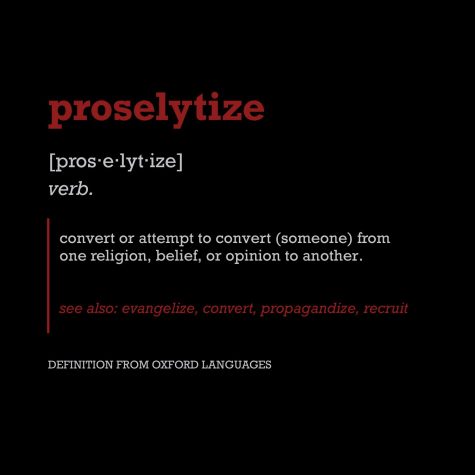
Simmons’ Spiritual Life Code of Conduct prohibits proselytizing and behaviors including “the issuance of misleading or false publicity,” “actions which are designed to coerce, either physically or emotionally, or which clearly damage a student’s academic pursuits, financial status, relationship with parents or peers,” and “intruding by phone, by mail, or by visitation in residence halls, on the privacy of individuals without their explicit permission.”
The Code of Conduct explicitly states that all groups wishing to meet on campus are required to go through the student organization approval process, however, there have been reports of the Church’s campus ministry operating on campus.
In addition to Agrella’s reports of the Church’s campus ministry holding weekly meetings in Evans Hall, Simmons students have reported to the Voice that there were weekly meetings taking place in the Evans Hall basement in 2017.
Although Simmons students were forced to move out of residence halls last March due to the COVID-19 pandemic, the Boston Church of Christ is still able to baptize students into membership. At least one student being baptized over the summer after completing the prescriptive studies while remote during the spring 2020 semester.
In tomorrow’s coverage, we dive deeper into the history of the Church, how experts say the Church’s campus ministry could be managing to stay hidden, and how administrative changes at Simmons have left the University without a Director of Spiritual Life.
*We originally misspelled Dean Antonelli’s last name, and have since made the correction.

In Plain Sight: Part II
After attending a handful of group “Bible talks” in the Evans Hall basement in 2015 during her first year as a student at the neighboring Emmanuel College, Danielle Agrella said that one of the Simmons students who originally invited her wanted to meet with her for an individual Bible study.
Because she was new, they were to meet weekly to go over the ‘foundations’ of the Bible, despite Agrella attending three different youth groups at three different churches in middle and high school.
This smaller group followed the same formation and series of lessons which originated in the early days of the International Churches of Christ. Once an initial connection with a potential convert is made, they are encouraged to attend group “Bible talks” and to start an individual Bible study.
The individual studies are referred to as “discipling,” held without disclosing that the goal of the person leading the study, the “discipler,” is to get them baptized into membership of the International Churches of Christ as soon as possible.
Another member of the Church’s campus ministry, typically a newer member of the Church, sits-in and takes notes for the potential convert who is still unaware that they are a potential convert.
The discipler follows the steps written out in what essentially is a study guide, sometimes referred to as “Making Disciples” or “First Principles,” teaching that the entirety of the Bible is absolute truth and is to be taken literally.
To be a real Christian, a disciple, is to be baptized. Potential converts don’t find out until later, however, that the only way for a baptism to be valid is if it is a baptism into the International Church of Christ.
International Church of Christ Congregations across the nation “all use some variant of First Principles/Making Disciples,” that have had little change since their inception in 1967 according to Chris Lee, the Executive Director of REVEAL.
An organization of former members of the International Churches of Christ, REVEAL’s website says its purpose is “to provide accurate, detailed and complete information about its (the Churches) beliefs and practices.”
In addition to the discipling meetings and Bible talks, the Church encourages potential members to spend increasing amounts of time with the Church by attending multiple services each week, game nights, retreats, and other social events.
Seeing years of destruction and repetitive patterns of students involved with the Church being isolated from friends, sharp declines in academic performance, and loss of interest in curriculars outside of the Boston Church of Christ, the late Rev. Robert Watts Thornburg, Dean of Boston University’s Marsh Chapel, published his observations in 1988, warning students, parents and neighboring institutions of the church’s practices.
Thornburg’s policies and guidelines for Boston University (BU) were adopted by schools throughout Boston, with administrators at Harvard and Northeastern explicitly advising students to be wary of the International Churches of Christ.
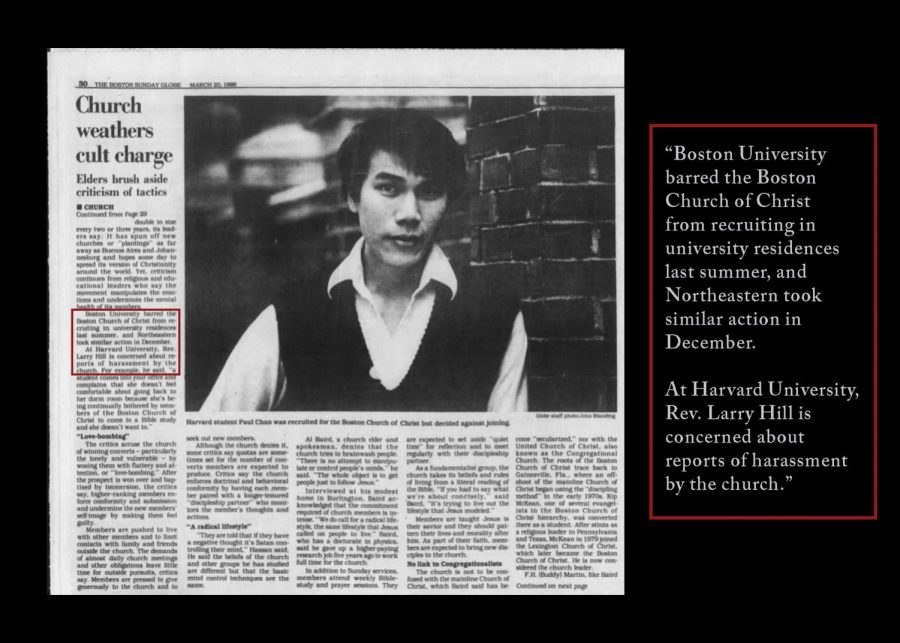
“Boston University barred the Boston Church of Christ from recruiting in university residences last summer, and Northeastern took similar action in December.
At Harvard University, Rev. Larry Hill is concerned about reports of harassment by the church.”
Simmons’ Spiritual Life Code of Conduct prohibits proselytizing and behaviors and explicitly states that all groups wishing to meet on campus are required to go through the student organization approval process.
Former members of the Church and experts on destructive faith groups claim that nearly all of the potential member’s free time is spent with those associated with the Church. The time commitment sometimes removes them from prior friendships, extracurriculars, academics, and even their families.
One of “the most damaging things and hurtful things” about the behaviors of the International Churches of Christ is how they say “your family is not your family,” said an administrator at a higher-education institution in Eastern Massachusetts about the Church’s presence on college campuses. The Voice granted the administrator anonymity, as they were fearful about possible repercussions for speaking to the press.
According to the source, messages and actions of the Church attempt to convey that they are the members’ new family. “They start isolating you from your family and your friend group. You know, love-bombing you, reaching out, not taking no for an answer.”

As the discipling studies and potential member’s level of involvement progress, the Boston Church of Christ’s version of First Principles covers the topic of persecution in the ‘Discipleship: Light & Darkness III’ study, saying that one “can’t be a disciple and never be persecuted.”
At some point throughout the series of studies, the discipler and the note taker disclose which church they are a part of. In Agrella’s case, it took nearly two months of attending the Bible talks in Evans Hall and her individual studies for the students who invited her to disclose that they were affiliated with the Boston Church of Christ. The description they gave to her prior to that point was a “non-denominational evangelical church group.”
Agrella’s discipler told her about how during the 80s their church had faced persecution because its leader “converted so many people and he had such a good following that there were a lot of people that felt that he was making a cult out of our religion pretty much in this… sector of Christianity. This Church.”
As the Church has garnered years of controversy and warnings surrounding its behaviors, any criticism or questioning of behaviors gets pinned as persecution in order to be put into a Biblical context.
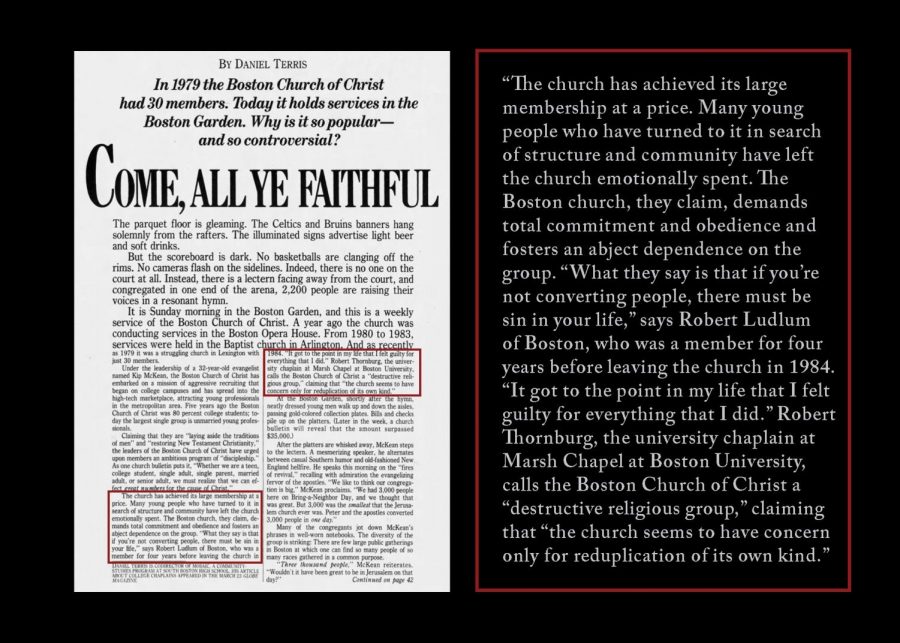
“The church has achieved its large membership at a price. Many young people who have turned to it in search of structure and community have left the church emotionally spent. The Boston church, they claim, demands total commitment and obedience and fosters an abject dependence on the group. “What they say is that if you’re not converting people, there must be sin in your life,” says Robert Ludlum of Boston, who was a member for four years before leaving the church in 1984. “It got to the point in my life that I felt guilty for everything that I did.” Robert Thornburg, the university chaplain at Marsh Chapel at Boston University, calls the Boston Church of Christ a “destructive religious group,” claiming that “the church seems to have concern only for reduplication of its own kind.”
The version of First Principles currently in use by the Boston Church of Christ says “Jesus was thought to be crazy and dangerous even by his own family,” posing the questions “if you are going to follow him what do you think will happen to you?” and “if you are not ever persecuted, what does Jesus say about you? Woe.”
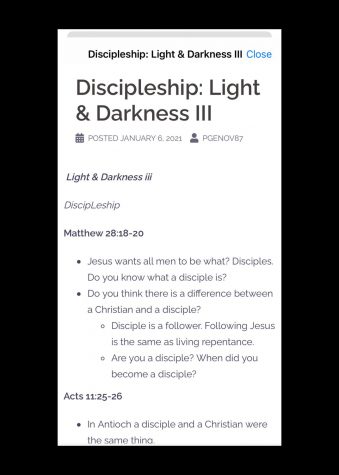
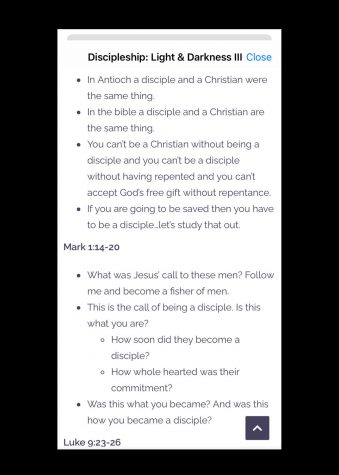
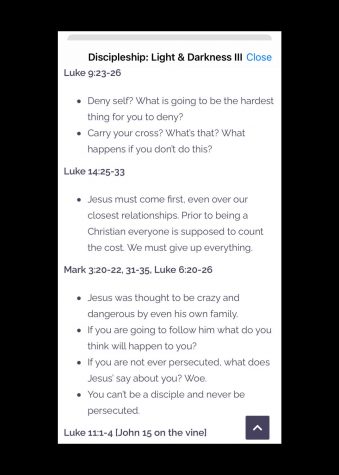
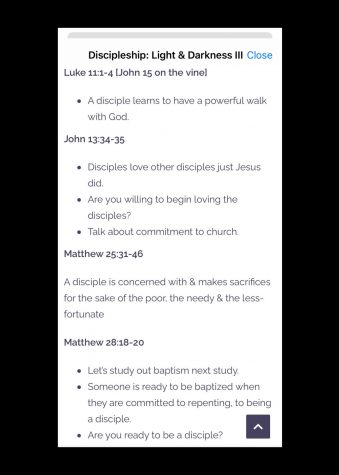
The version of First Principles currently in use by the Boston Church of Christ was retrieved through the free ICOC NE phone app, which can be found in the Apple App Store, as well as the Google Play Store.
There is a less detailed version of First Principles, or the “Bible Study Series” on the website of the Boston Church of Christ as a pdf. document. The document on the website is only accessible with a mobile phone.
In the disclosure of the controversies, Agrella said that her discipler told her ‘you’re gonna find all this old stuff if you even look it up, I don’t want you to be worried about that.’
“I completely fell for it,” said Agrella. “I never once researched it. Never.”
Since the Church’s heyday in the 80s and 90s, education systems were created for students and administrators in order to protect students from destructive faith groups, according to Shelli Jankowski-Smith.
Jankowski-Smith worked closely with Thornburg at the Marsh Chapel and has nearly 25 years of experience working in higher-ed spiritual and religious life in Boston at BU and Northeastern.
By the time of her arrival at Northeastern in 2004 as the Director of Spiritual Life, Jankowski-Smith said that the frequency of reports of the Boston Church of Christ being on campuses had decreased, partially attributing the education systems and creation of policies and guidelines against destructive faith groups.
Although the information about the Church proved to be successful in keeping its campus ministry off-campus and away from students, every few years the Church would pop up on Jankowski-Smith’s radar.
“I think that they got wise to the fact that campuses were really being much more aware of issues and they were just finding new ways to try to weave into the fabric of the campus life,” noted Jankowski-Smith.
The Boston Church of Christ’s campus ministry has been going by the name “Alpha Omega” since as early as August 2015, the time of their first post on Instagram using the name in both the caption and image.
Susan Antonelli, former Simmons University Dean of Students as well as the administrator at a higher-education institution in Eastern Massachusetts, had been unaware of the name until the time of their interviews with the Voice.
The administrator said that the name switch is “indicative” of “shame or secrecy” of the group and their presence on college campuses.
Name changes and use of various “front groups” is one of the ways in which the “Church continues to exist” on college campuses, according to Lee. “They’ll make all these different groups. And it’s kind of hard to figure out what they’re about.”
Lee stated that members are not forthcoming with what church they are associated with until students are well into the proselytizing process.
“It’s like pulling teeth to get any kind of information out of them,” said Lee, noting that oftentimes the information given prior to revealing the church they are associated with is a “nondenominational church group.”
The lack of clarity about what one is getting involved with was mirrored in the stories of former members of the Boston Church of Christ, as well as other International Churches of Christ congregations throughout the country.
The Voice made multiple attempts to contact the Boston Church of Christ about the history of its campus ministry, its existence at Simmons, and how long they have been using the name “Alpha Omega.” Eventually, requests for an interview or comment were declined*.
The position of Director of Spiritual Life at Simmons was eliminated in 2019, however, at the time this story was published, March 18, 2021, Reverend Bonnie-Jean Casey is still listed as the director on the Spiritual Life webpage.
Less than a month and a half before her planned departure from the University after 10 years at Simmons, Antonelli explained that the elimination of the Director of Spiritual Life position was due to budget cuts in recent years.
Administrators “felt like it was most important to have the individuals who are doing the on-the-ground work and advising the student organizations,” according to Antonelli. This approach can be seen in Simmons’ Islamic Society, or Simmons Hillel, where each group has an individual advisor.
There is currently a vacancy for a Christian chaplain, with Antonelli saying “we decided that we were going to wait until we were back on campus to have to do any further searches for any of the faith-based chaplains.”
“Any credible higher-ed college, university, institution, needs to have someone in a director of spiritual life who can troubleshoot this,” said the higher-education administrator about the Church’s presence on college campuses.
Antonelli emphasized she would not automatically deny a student’s request for any faith group to meet on campus, but said “if there’s a group that is known to have predatory practices on college students, I would have to have a really good reason to allow that group on campus.”
During the spring semester of 2020, one of the schools in the Colleges of the Fenway Consortium got a call from a parent who was concerned about the Boston Church of Christ’s presence on one of the campuses, according to Antonelli.
While she could not disclose at which neighboring institution the reported incident occurred, Antonelli says that she and Assistant Dean Corey Zohlman went through all of the room reservations on Simmons’ campuses to see if the Church was meeting.
Antonelli said that she and Zohlman found no evidence, concluding that the group was not meeting on the academic or residential campuses of Simmons.
In addition to Agrella’s reports of the Church’s campus ministry holding weekly meetings in Evans Hall, Simmons students have reported to the Voice that there were weekly meetings taking place in the Evans Hall basement in 2017.
“If they are sort of wiggling their way onto campus, somehow, it’s unknown to me,” said Antonelli, going on to explain that she isn’t able to do anything if it has not been brought to her attention, or if the Church isn’t booking spaces on campus. “I can’t be everywhere at all times.”
“We have a pretty good system of monitoring, whether it’s social media accounts, and then certainly any outside group that comes to campus,” said Antonelli. “That’s something that between OSLA and Student Affairs, we would be keeping a good watch on.”
Despite the system of monitoring that Antonelli spoke of, as well as Simmons holding remote courses amidst the COVID-19 pandemic, Simmons students are still being baptized into the Church.
In tomorrow’s coverage, we hear from a Simmons student who began studying the Bible during the 2020 remote spring semester and was baptized into the Boston Church of Christ over the summer along with the role church elders and church leaders play in retaining members of its campus ministry.

In Plain Sight: Part III
As stated at the beginning of this series, the Voice knows the identities of the Boston Church of Christ’s campus ministers, who are a married couple. Our editorial team has decided to not publish their names in this series.
For clarity, we will refer to them as H for the husband, and W for the wife.
The kindness Danielle Agrella felt in 2015 from the two Simmons students who invited her to study the Bible, and the new group of friends she made through the Bible Talks and Church events is something that she now considers to have been love bombing and manipulation.
Before coming to that realization, however, Agrella said she felt a sense of belonging with the Church during her first year as a student at neighboring Emmanuel College, allowing her to be so trusting when the Church gave her an illusion of transparency about its past controversies.
Agrella said that her discipler told her ‘you’re gonna find all this old stuff if you even look it up, I don’t want you to be worried about that.’
“I completely fell for it,” said Agrella. “I never once researched it. Never.”
Agrella was baptized towards the end of the spring semester of her first year, 2015.
Before going home to New Hampshire for summer break, Agrella had a final group meeting with her discipler, note-taker, and campus minister. She said the group warned her that when her friends and family found out about her baptism, they may make comments saying that the way she was choosing to practice her religion was wrong. They told her this was called “persecution.”
“They even said your family might turn against you on it,” recalled Agrella. The three even suggested she not tell her friends and family about her involvement right away to ease them into it in a way that might make them want to become “disciples” themselves.
Agrella says that the campus minister, W, told her “let them notice how great you’ve been, how awesome you are, and how changed you’ve been, in a good way.” By returning home and being “the best daughter and the best sister and the best friend that you’ve ever been” Agrella was told that the people around her would become curious about why she was so happy, making them more willing to learn about the Church.”
W stressed the importance of reading the Bible every day, and doing everything possible to “stay with it,” Agrella recalled. Being at home for the summer she wouldn’t have the Bible talks, services, discipling meetings and the plethora of other Church events that took up her time and kept her focused on her faith.
“They pretty much would check on me at least once a week and ask like if I’m still doing all these things,” said Agrella.
She was even connected with an International Church of Christ congregation in New Hampshire in order to continue her involvement with fellow disciples.
Through Agrella’s interview and Alpha Omega’s social media posts, the Voice confirmed that W was involved in the discipling of a Simmons student who was baptized into the Boston Church of Christ towards the end of summer in 2020.
The Voice will refer to the Simmons student as “Kay” because of her anxieties about misconceptions from her family and friends outside of the Church, and repercussions from her peers within the Church if her name is disclosed.
While Kay was struggling through personal issues along with the feeling of having no control over life, a sentiment exacerbated by the pandemic, a member of the Boston Church of Christ, also a Simmons student, reached out and asked her if she would be interested in studying the Bible.
When the spring 2020 semester came to an end Kay began virtually studying the Bible in order to have something that could give her structure and something to look forward to.
“I feel like more than anything, it just like, gave me a community of support, in a way, which I didn’t necessarily anticipate,” said Kay. “I don’t know, it’s just, it’s really encouraging the way that people are there for each other and care for each other.”
Each week, Kay met virtually with the Simmons student who invited her to study the Bible, as well as another Simmons student.
Although Agrella said W would occasionally attend the weekly meetings in the basement of Evans Hall in 2015, what sets Kay’s experience apart from the others documented, is that W took part in her discipling sessions.
While W and the two other students all took turns leading the weekly studies, Kay said that they were always focused on her own learning, which led to her baptism.
“I don’t know if this is the case for most people, but for me, I sort of felt like, in a way, it was the next step,” Kay said.
“It is a very personal decision for everyone. But for me, like I didn’t really dwell on it too much,” noted Kay. “I did the studies, and then it’s like, ‘Okay! Now you get baptized’ type of thing.”
Towards the end of the summer, the other Simmons student picked Kay up to baptize her, and they drove to a beach in Boston. W watched on as the student who initially invited Kay to study the Bible joined in by video chat.
Subsequent requests made to Kay for interviews were avoided. Current members of the Church and its campus ministry, Alpha Omega, declined to give a comment or be interviewed, while some did not respond to requests for interviews.
Agrella said returning home to New Hampshire for the summer is when she was able to realize that feeling the need to share her ‘sins’ with fellow disciples “wasn’t a healthy sort of confessional.”
“I just felt guilty about doing pretty much anything,” said Agrella, adding that she felt as if the Church attempted to control her personal choices.
This manifested for her through feeling “forced” to only date other people within the International Church of Christ and noticing a negative attitude about how her intensive major within the STEM field would take away from time spent with the Church.
The feeling that the Church controls a disciple’s life is not new.
First Principles, (also called Making Disciples,) is a step-by-step study guide for discipling, and states that in ‘The Church’ study, “disciples in the Church are committed to dating/marrying only other disciples (in the Church,)”
International Church of Christ Congregations across the nation, “all use some variant of First Principles/Making Disciples,” that has had little change since their inception in 1967 according to Chris Lee, the Executive Director of REVEAL, an organization whose purpose, according to its website is “to provide accurate, detailed and complete information about its (the Churches) beliefs and practices.”
Former members of ICOC congregations across the country told the Voice about how ministers and church elders set students in the campus ministry up with other disciples who are, “equally yoked.”
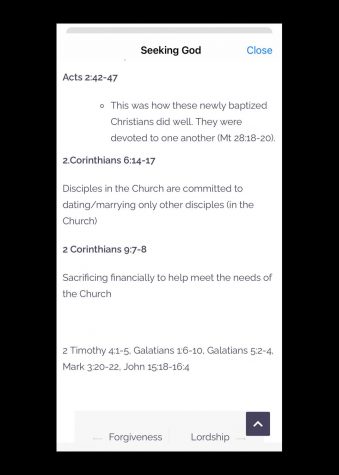
The version of First Principles currently in use by the Boston Church of Christ was retrieved through the free ICOC NE phone app, which can be found in the Apple App Store, as well as the Google Play Store.
There is a less detailed version of First Principles, or the “Bible Study Series” on the website of the Boston Church of Christ as a pdf. document. The document on the website is only accessible with a mobile phone.
During her summer vacation, Agrella said her mother began to notice the guilt and sadness that was enveloping her due to her constant awareness of ‘sin.’
She said through her mother’s research they discovered years of reported attempts of the church separating students from their families.
“It all started getting put together,” Agrella said.
Deciding to cut ties with the Church during her summer at home, Agrella said that she deleted “80 to 100” Facebook friends and Instagram followers that she had gained through her involvement with the Church and its campus ministry.
“They were pretty persistent, still messaging me randomly,” said Agrella while noting that she would ignore the messages, or respond saying that she wasn’t interested in continuing.
Church members have spoken about techniques they use to keep disciples in the Church at the International Church of Christ International Campus Ministry Conference (ICMC,) held in Cincinnati, Ohio, in July 2018.
Audio recordings from the conference were posted to SoundCloud by ‘Disciples Today,’ the official media outlet of the International Churches of Christ.
H begins speaking just after the 23:25 mark.
In the recording, H spoke of an adult member of the Boston Church of Christ knocking on a student’s dorm door in order to “get ahold of her,” as she was deemed to be one of the “weakest” members of the campus ministry by ministers and Church Elders.
While he did not say at which school in Boston this took place, during his four minutes of speaking H explained that getting members of the Church’s marrieds ministry and professionals ministry to spend time with the “15 weakest” students was proving to be effective in keeping students from “falling away,” aka leaving the Church.
According to what H said in the recording from ICMC 2018, during monthly dinner meetings with Church elders, ministers, and a “handful” of people from various ministries within the Boston Church of Christ, dinner guests determine which students are at risk of leaving the Church.
“We have a whole spreadsheet where we have the person’s name, where they’re at, and then we come up with a plan for them until the next month,” said H in the recording.
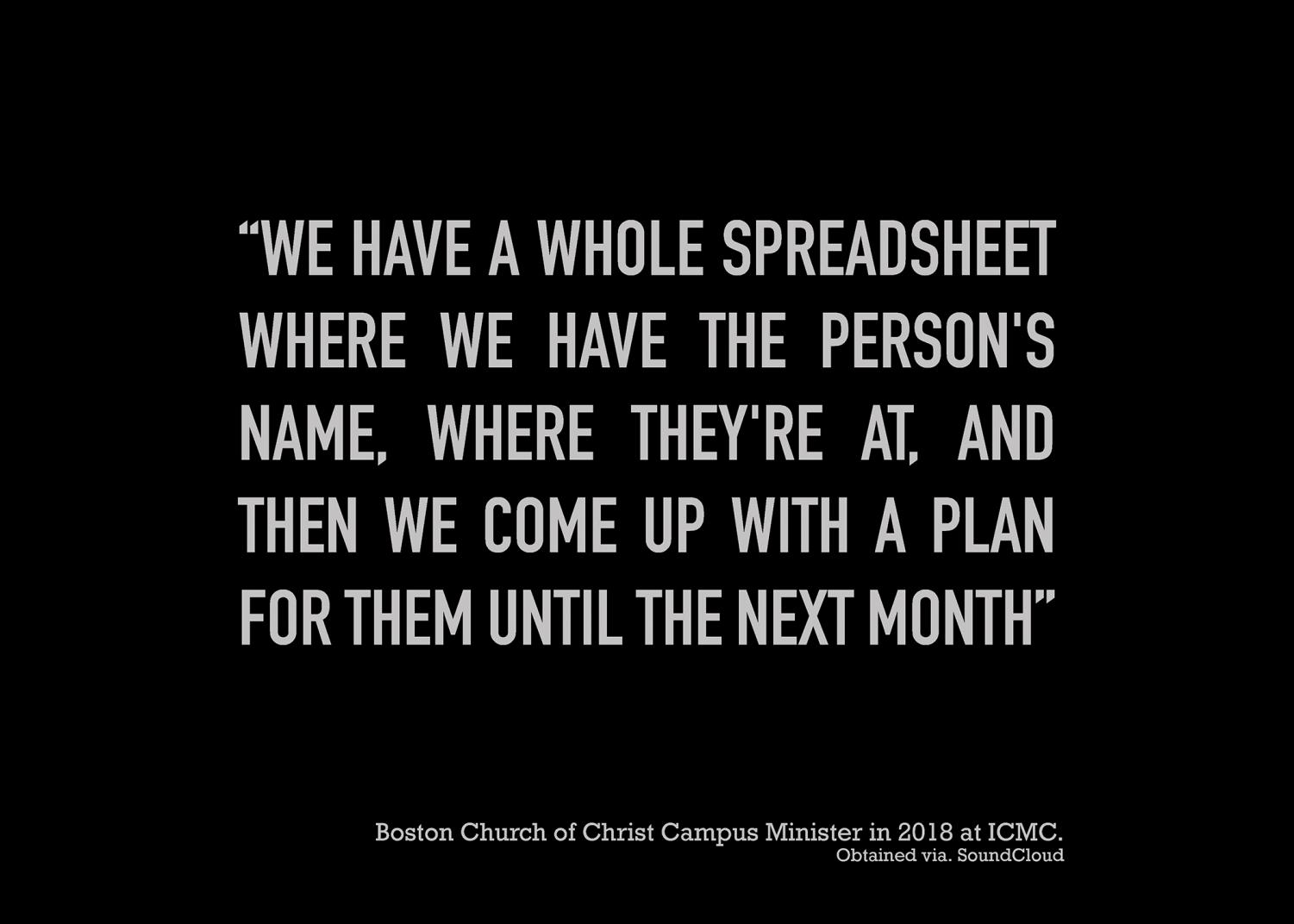
After Agrella left the Church, the fear of returning to Boston and being talked back into the Church was so intense that she said she considered transferring.
“I think the hardest part was coming back to campus and being afraid to run into them because I’d definitely have to deal with that,” said Agrella.
The first three months after leaving the Church, Agrella said that her mind was filled daily with guilt about her sins. For the next year “randomly thinking about it” or seeing someone from the Church would cause a visceral reaction.
“My heart would race and I’d be so nervous they were going to confront me,” said Agrella.
Sitting outside on a bench during an event on the Emmanuel campus, Agrella said that she saw someone who was a member of the Church who she was once close with approach a student on the quad.
After the member of the Church walked away, Agrella said she went over to the student and asked if she had been invited to go to a Bible group.
When the student said yes, Agrella shared part of her experience and offered a word of warning.
Due to the trauma that Agrella faced and how difficult her situation was for her to talk about, it wasn’t until 2018, her senior year, that she said she told an administrator at Emmanuel what had happened.
“I don’t know if she ended up doing anything with it. But I told her all about it,” recalls Agrella. “She had heard of [the Boston Church of Christ] already.”
The time that it takes for people who have left the International Churches of Christ to be able to talk about their experiences is a recurring theme in the interviews the Voice had with former members across the country. Agrella herself was originally hesitant to have her name used in this article.
Currently in a direct-entry nurse practitioner program in Massachusetts, she said while she was only involved for four months, it took far longer for her to heal from her experiences.
“I guess I kind of did go through a little bit of a whirlwind with them in a short amount of time,” laughs Agrella after sharing her story. “I feel lucky that I left when I did,” her voice quickly flattening.
“I’m one of the lucky ones.”
Check back next week for the final story of this series, where we explore why it takes some former members time to share their experiences, what’s holding them back, and the path forwards for the Simmons Administration, Student Affairs, and Spiritual Life in protecting Simmons students from destructive faith groups.
*The Voice made multiple requests by email, phone call, and social media to the Boston Church of Christ and its Campus Minister for an interview or statement.
After two phone calls to the Church in order to confirm whether or not the requests had been received, someone from the Church called back to say that they had.
When asked why requests were not acknowledged, the person calling from the Church, who refused to give their name on the record, said that what is in the media about the Church gets twisted/spun, so it’s easier to ignore requests than to decline.
Asking for clarification, the Church declined to provide a statement or interview for this series.
While the Voice knows the identities of the Boston Church of Christ’s campus ministers, our editorial team has decided to not publish their names in this series.
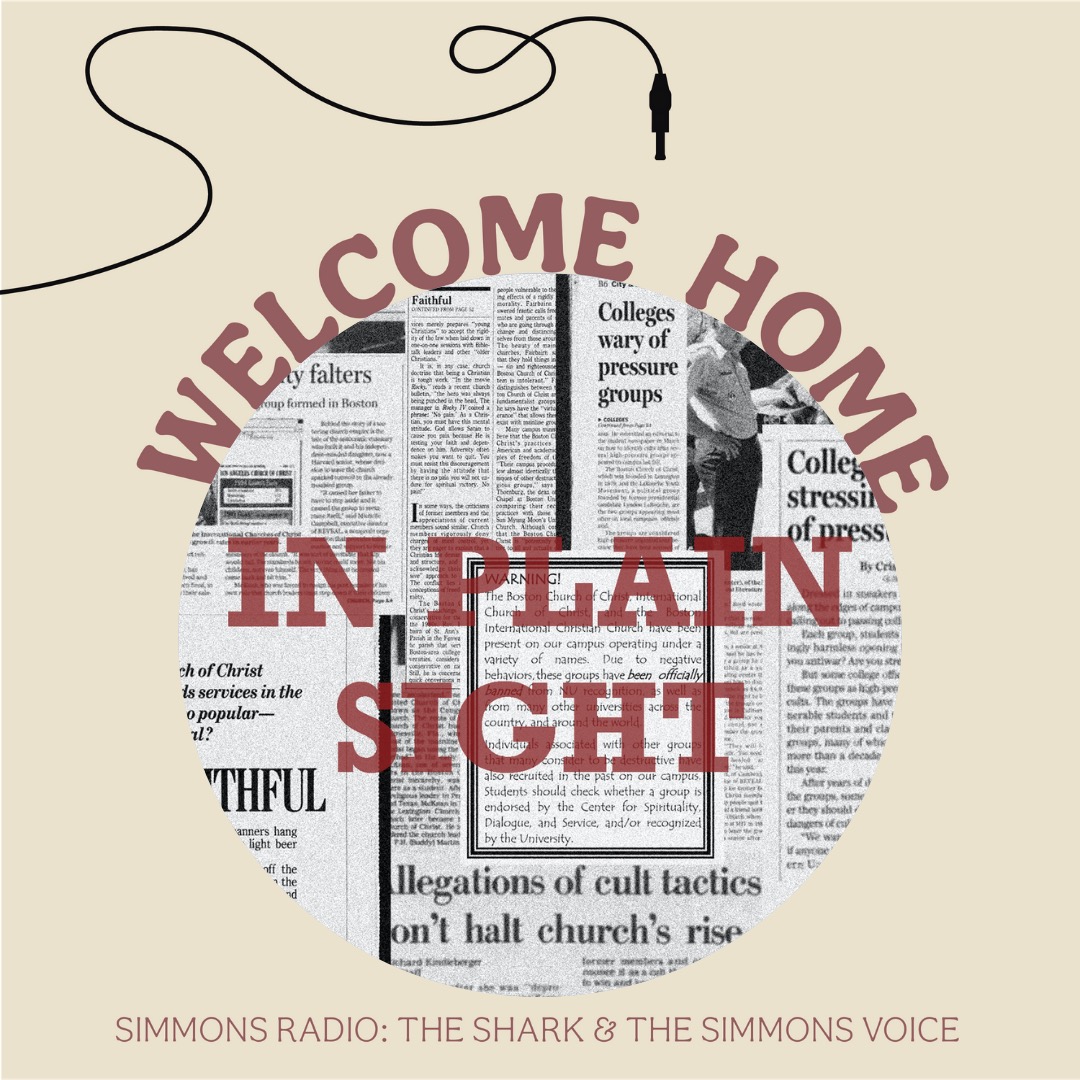
In Plain Sight: An Update
After publishing the first three parts of In Plain Sight, the Voice has heard from current Simmons students who have had experiences with the Boston Church of Christ. In responses received via email, social media messages and comments, students have shared a range of experiences with/regarding the Church, from being stopped multiple times on the street in between Simmons residential and academic campuses, being warned of the Church from other faith groups, and being inundated with emails and texts asking them to attend Bible talks. Simmons sophomore Abrielle Cunningham, whose podcast has an episode detailing experience with the Church, came forward and spoke with the hosts of the Voice and Simmons Radio: The Shark’s podcast Welcome Home, about her time with the Boston Church of Christ.
For a transcription of the episode, click here.
With the new information the Voice has received, the fourth part of the series is taking longer than originally anticipated.
We are working diligently on part four, and in the meantime are sharing this Sidebar and a special episode of Welcome Home.

In Plain Sight: Part IV
After her freshman year at Emmanuel College in 2015, Danielle Agrella went home for the summer with a new faith community. She soon found out however, that the Boston Church of Christ had a deeper history than she thought.
Researching the Boston Church of Christ, Agrella and her mother found reports of the years of the controversy surrounding the Church and its campus ministry, currently going by the name ‘Alpha Omega.’
The research dug up what academics, mental health professionals, higher-education administrators and former members alike describe as predatory practices, psychological manipulation, and destructive behaviors. With these new revelations, along with what Argrella said was a near-constant feeling of guilt for her sins, she decided to leave the Church.
Cutting herself off from the Church meant cutting herself off from the friend group that she spent most of her time with, from services on Sunday and Wednesday, Bible Talks, Bible Studies, and Devotional nights.
Former members of the Boston Church of Christ, as well as other International Churches of Christ (ICOC) congregations and experts, told the Voice that members are even encouraged to live with one another.
Chris Lee, the executive director of REVEAL, an organization whose purpose, according to its website, is to “provide accurate, detailed and complete information about [ICOC] beliefs and practices,” explained that fellowship and being in an environment that is, “good for one’s faith” is the explanation members get when pushed to live with one another.
A former member of an ICOC congregation located in the southeast United States said that disciples being encouraged to live together added to the feeling that “someone is always watching.”
Due to fear of character assassination and repercussions that speaking with the press could have on his family, the Voice granted this former member anonymity and will refer to him as Clem.
Clem said that he questioned who he would have and what would be out there for him without his congregation, a consideration that kept him a part of the Church long after beginning to think about leaving.
Clem explained that said that as a member, individuals are expected to share with their discipler any sins they committed prior to baptism, any sins they continue to commit, and additionally any sinful thoughts they may have.
“They essentially use shame and guilt as a means to convert,” Clem told the Voice.
Guilt and shame are feelings that Simmons student Abrielle Cunningham said she felt while involved with the Boston Chruch of Christ.
During the first semester of her freshman year in 2019, Cunningham said she was approached by two students with an invitation to study the Bible. She began to attend weekly Bible Talks which according to Cunningham took place in the downstairs dining hall on Simmons’ academic campus, the Fens.
From there she began her discipling meetings, attending Church on Sunday, Midweek worship on Wednesday, and Friday night Devotionals. What started as a one hour per week commitment, according to Cunningham, quickly turned into five or six days of her week spent with the Church.
Cunningham echoed what previous members had touched upon– encouragement to spend as much time as possible with the other disciples and an emphasis placed on her eventual baptism.
Cunningham recalled instances of returning to her dorm after Church activities in tears due to the emotional stress of being told that her loved ones could not be saved unless they were baptized.
“That really scared me because I was like, What about everybody else? What about all my loved ones, my friends?” Cunningham said. “They told me that Satan was working through my mom when she told me not to join.”
Leading up to Cunningham’s baptism, she said that her discipling leaders told her that she would have to confess her sins to them before getting baptized.
“They gave me a week to prepare for the confession,” said Cunningham, noting that she was told she could prepare by writing out a list.
The late Reverend Robert Watts Thornburg, former Dean of Boston University’s Marsh Chapel, published a document in 1988 with his observations of how the Boston Church of Christ was negatively impacting students negatively. He wrote about the Church, “constantly requiring members to share all of their deepest secrets of the past on the theory that the discipling partner can somehow remove those so-called stains of guilt.”
Thornburg, other experts, and some former members including Clem report that the awareness of someone out there knowing all of their sins can be used as a way to keep people in the Church if having thoughts of leaving.
Because Clem was raised in the Church and left when he went to college, the awareness that someone knows all of his sins hung over his head when grappling with the thought of leaving. It still does, which is a contributing factor as to why he didn’t want to be identified in this article.
Once baptized, members are expected to recruit other people to join the Church. Clem noted that from his experiences in the Church until 2015, faithfulness is measured by how many people each member can bring into the Church, an expectation supported by Thornburg’s 1988 article.
Cunningham echoed this, saying that she was told by her disciplers that once she was baptized she would be expected to get other people to join.
Although Clem felt that he was doing wrong by recruiting people into a faith group where he himself felt uncomfortable with the practices he saw, he continued his involvement due to his fears of character assassination and being cut off from Church friends.
“If I’m not saving people, what am I doing,” Clem said, citing that it was instilled in him that it was his purpose to convert others.
The Voice reached out to Church leaders and current members of the campus ministry to better understand the Boston Church of Christ’s current practices and the changes in the Church since the allegations of spiritual manipulation and controversy of the eighties and nineties. Multiple requests were made by email, phone call and social media for an interview or statement.
After two phone calls to the Church in order to confirm whether or not the email requests had been received, the Church called back to say that they had gotten the requests.
When asked why requests were not acknowledged, the person calling from the Church, who refused to give their name on the record, said that what is said in the media misrepresents the Church, so it’s easier to ignore requests than to decline.
Asking for clarification, the Church declined to provide a statement or interview for this series.
The most recent public acknowledgment of wrongdoing in the Church took place in 2003, with subsequent reporting from the Boston Globe and the Chicago Tribune.
In 2003, Henry Kriete, a leader of the London Church of Christ, wrote an open letter about the problems he had witnessed inside the International Churches of Christ.
In response to the letter as well as a push “by some who had long resented his leadership style,” the founder and leader of the ICOC, Kip McKean, stepped down from his position of leadership.
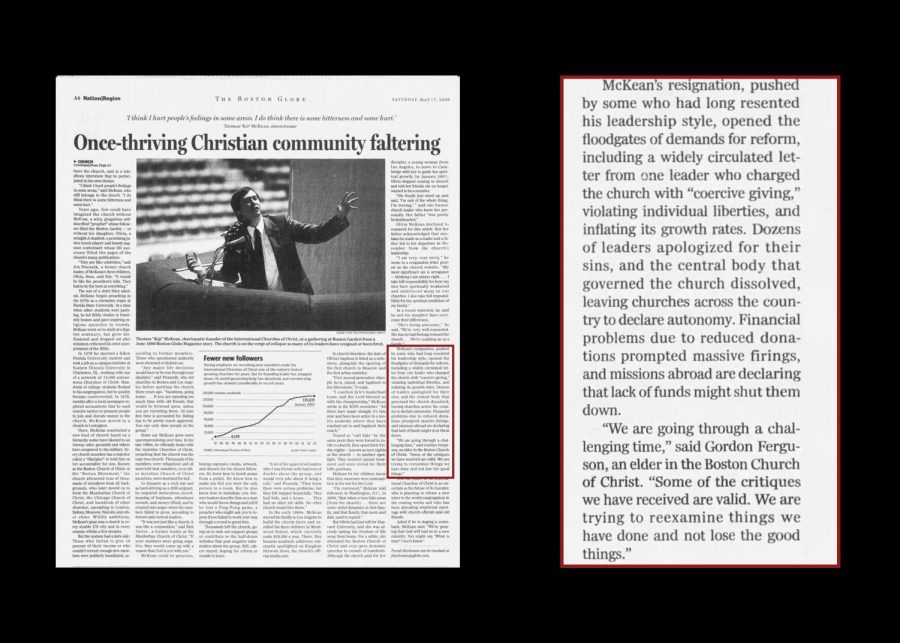
“McKean’s resignation, pushed by some who had long resented his leadership style, opened the floodgates of demands for reform, including a widely circulated letter from one leader who charged the church with “coercive giving,” violating individual liberties, and inflating growth rates. Dozens of leaders apologized for their sins, and the central body that governed the church dissolved, leaving churches across the country to declare autonomy. Financial problems due to reduced donations prompted massive firings, and missions abroad are declaring that lack of funds might shut them down.
“We are going through a challenging time,” said Gordon Ferguson, an elder in the Boston Church of Christ. “Some of the critiques we have received are valid. We are trying to reexamine things we have done and not lose the good things.””
Lee confirmed that the response from leaders in the Church to the Kriete letter is the most recent public acknowledgment of wrongdoing on behalf of the Church. However, Lee said that the ICOC and its congregations did not specifically acknowledge the ways in which discipling can be problematic.
The Boston Church of Christ currently tells potential members and critics that after McKean’s resignation, the Church reformed the practices that garnered controversy in the 80s and 90s. However, after publishing the first three installments of this piece, current Simmons students who have interacted with the Church have come forward and shared experiences similar to those of the past.
After Cunningham cut ties with the Church in December 2019, her mother called Simmons to alert them about the group’s presence on campus. While she doesn’t know exactly who or what department her mother addressed these concerns to, she was told that there wasn’t anything they could do about the Church due to the complexities of what could be considered as religious discrimination.
Former Dean of Students Susan Antonelli told the Voice in November prior to her planned departure that she wanted to make it clear that while she recognizes that the Boston Church of Christ has a history of predatory practices, that she also recognizes the importance of freedom of religion, and that Simmons strives to be a diverse and accepting environment.
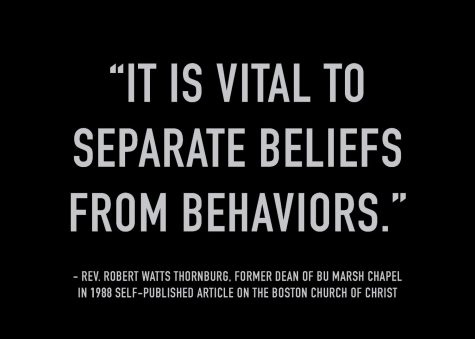
Simmons’ stance reflects what Thornburg wrote in a self-published 1988 article that a university campus is the “very last place in the world” where ideas or religious beliefs should be suppressed. However, when faith intersects with repeated predatory practices, Thornburg wrote that “decisive action” can be taken in order to protect students from harmful behaviors.
“The University has both the right and the obligation to protect students from false and deceptive activities that harm students and threaten the full and healthy development of learning and faith on the campus,” Thornburg wrote.
With the recent arrival of Dr. Renique Kersh as the Vice President of Student Affairs, Kersh and her team will have to contend with a faith group already enmeshed in the Simmons community.
“We’ll always, of course, do our best to protect students from predatory organizations, to the extent that we know that they exist,” said Kersh in a March 2021 interview with the Voice, encouraging students who are, “engaged in these conversations, or they know that this is happening, [with the Church]” to come forward and alert Student Affairs.
When the role of director of Spiritual Life was eliminated in August of 2019, the jurisdiction of the Office of Spiritual Life has moved back and forth from Student Affairs to the Office of Organizational Culture, Inclusion and Equity, making it unclear for students to know where to report concerns with faith groups.
Kersh said that Spiritual Life once again falls within Student Affairs, and will remain in Student Affairs, and added that she is looking to identify gaps and create an organizational structure for the department.
While Kersh is still analyzing the best path forward for the structure of Spiritual Life, she said that she is thinking about how the institution can “make sure that its clear to students that they can find a home within our Spiritual Life department”
When asked who students should go to in the meantime with concerns of destructive faith groups, she offered herself as a point of contact.
“I know how important this issue is, and I want students to feel like they have a direct connection to me if they have specific concerns, and it’s one that we want to be able to address,” Kersh said. “Students can contact me directly at the moment if they have concerns, and in fact, I encourage them to.”
With the unawareness of the Church’s presence and influence on college campuses, Cunningham noted the importance of having conversations about the Church and people’s experiences in order to spread awareness to as many students as possible.
“It could happen to anyone, and I think it’s really important,” to talk about, said Cunningham.
If Simmons and other universities cannot ban faith groups such as the Boston Church of Christ and Alpha Omega, Cunningham said “the only other way to get people to know is through talking about it, and hopefully getting more people to listen, will– I’m not sure if I would say be enough for students, but it would be more than what a university could do, in my opinion.”

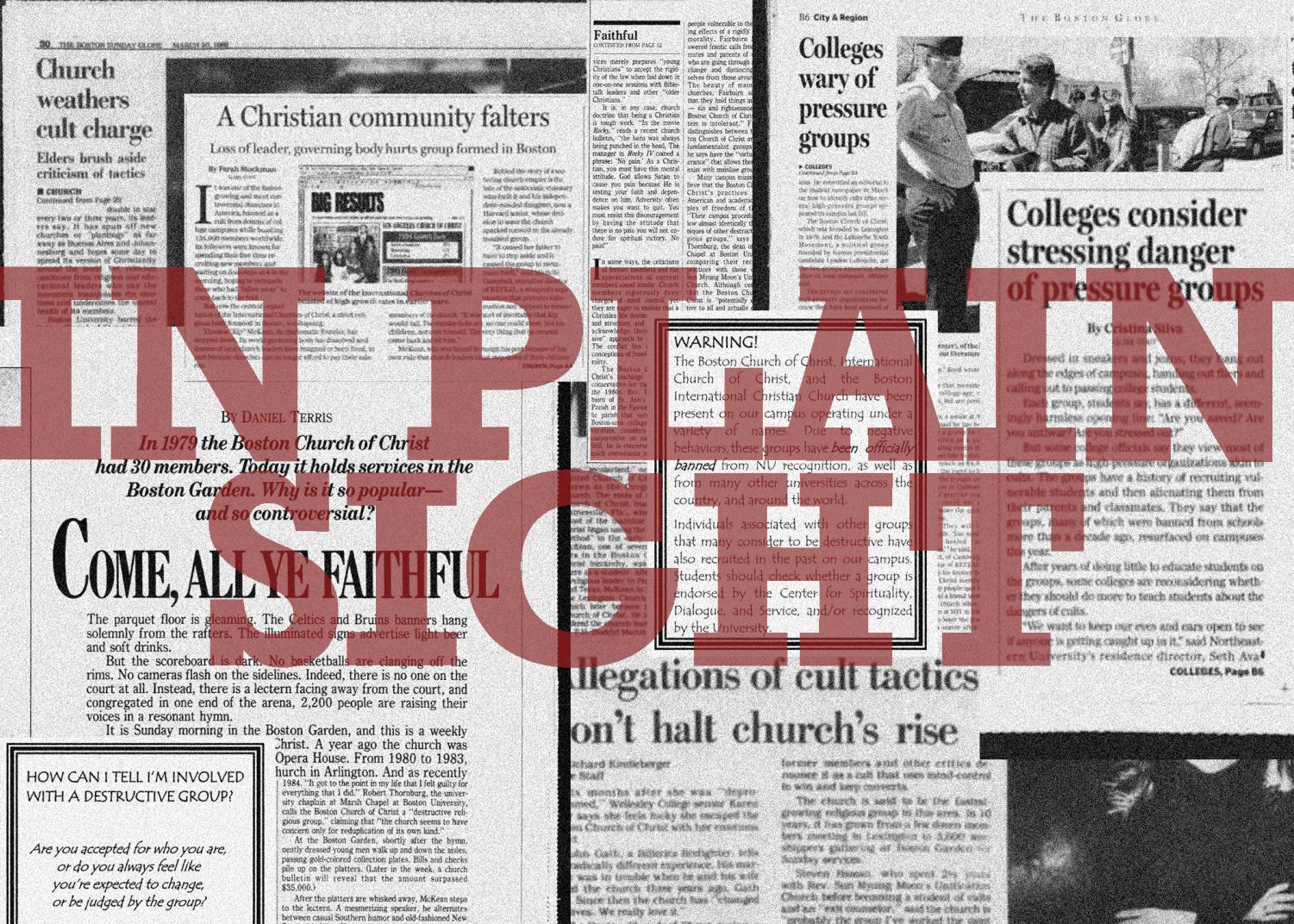
Amy M • Mar 5, 2023 at 4:57 pm
So I can’t comment on being in Boston, but I was a student at the University of Pennsylvania and became a member of this high-control, high commitment organization (I choose to call it a cult!) and know exactly what this article speaks of. I recruited people, I did all the things they write about… also, I understand the love, community, care and friendship expressed by others… but make no mistake, this is a cult! I’m almost 50 now and just now processing the trauma they caused in my life! Stay away and find a different way to seek God! Their way is exclusive and not healthy!
AnOldManNow • Jan 11, 2022 at 6:06 pm
Memories awaken. Attended and graduated from the University of Florida, 1973-76. Being a born-again Christian already, attended the infamous Crossroads CoC, under the leadership of Chuck Lucas. Being a newbie there, was extensively scrutinized about my faith, beliefs, etc. starting with Chuck Lucas and below. The on-campus recruiting and monitoring was even aggressive and extensive even then. I politely reminded the church leadership and many a brother that my #1 priority was Jesus was my Savior in my life, that I would attend additional functions where time allowed, and I had my own personal time for Scripture study and prayer, etc.; not based on their policies, requirements, demands, etc. My 2nd priority was to my education studies to ‘do my best’, since I was at the UoF for that very purpose. I will say that college time is a very good time to search for God if one has not already done so. One can initiate the search on their own or have assistance from others (i.e. on-campus ministry, local church). The others need to understand and know they can ‘plant the seed’ and pray … be available when needed … and let the Holy Spirit take over and ‘water’ / do its job, versus church members personally ‘drowning’ a new person by being overly persistent for whatever reason(s). Love is patient, love is kind. It does not envy, it does not boast, it is not proud. It does not dishonor others, it is not self-seeking, it is not easily angered, it keeps no record of wrongs. Love does not delight in evil but rejoices with the truth. It always protects, always trusts, always hopes, always perseveres. Love never fails. For the believers, life becomes – WWJD ? So it appears on-campus ministry, wherever it may be, still needs to be more Jesus-like; never overwhelming resulting in adverse affects on those interested and seeking God and Love, as well as impacting their studies not allowing them to do their best. My pennies worth of personal experience … time flies.
Rob • Oct 9, 2021 at 4:51 am
Bottom line : Stay away.
Alumna • Mar 30, 2021 at 3:24 pm
As a alumna of Simmons and a former member of the Boston Church of Christ campus ministry, there is a lot of facts that this article gets wrong. Importantly, when I was a member at Simmons we were in conversation with Religious life and even booked spaces to meet through the office. So, to act as if this some secret organization is false. Looking back I definitely think there were tactics taken that were wrong and misguided but I think you would find a lot of these same tactics in other evangelical churches. I think zealous college students make a lot of mistakes but I would say the same for other groups and organization comprised of college students. I wish the author had done more research and talked to former and current members of the group at Simmons. Like any church, not all members think the same thing and Simmons students were often at some odds with overall church culture especially when it relates to women’s issues and LGBT issues. I loved my time at Simmons and look back fondly on my time there
Molly • Mar 26, 2021 at 4:17 pm
this article is absurd. this church saved my life~ i actively receive help for my mental health, personal trauma i’ve experienced throughout my life, I get in depth marriage counseling, I have lifelong sister and brother type friendships, ect. the best people i have ever met. i went to Emmanuel, graduated in 2017. the way this article tries to induce fear is sad. Remember, there is 2 sides to every story. i don’t care to write some articulate, detailed response. I just had to saw something~ has its flaws because it’s filled with imperfect people and that’s agreed upon within the church. no one thinks they’re the “only church”. this is spreading fear, gossip, and lies is all.
Content Member • Mar 20, 2021 at 3:09 pm
Glad to see some people speaking against the tone / one-sided nature of this article in the comments section. As a current member of this group (attending of my own volition I promise!) I am saddened to see an argument built around such limited perspectives. As someone who has attended churches in the past where no one greeted me and I felt as though I was nothing but a “seat-filler” it has personally felt refreshing to be actually befriended by people who have taken a genuine interest in helping me learn more about the teachings of Jesus. The definition of love-bombing in the article seems very off from my experience which has been nothing but sincere love (I have made lifelong friends in this group!) Of course, no religious group is perfect and no doubt past mistakes & controversies could be drudged up for many a current group on campus (!) but the transparency of this particular church and their commitment to growing when faced with their mistakes is something that has reassured me and made me want to stay a member. I don’t usually comment on things like these but I feel compelled to offer my perspective to offset the frightening picture this article has presented of a group that has helped me tremendously!
Chris Lee (for REVEAL.org) • Mar 20, 2021 at 2:37 pm
I don’t think our information is “20 years old.”
I’ve been in contact with plenty of members and former members (including Danielle and her family) and quite recently, there was a group that was disfellowshipped here (Marcus, Manny, Justin, and Arluah) who discuss their experiences here: https://docs.google.com/document/d/1ukh7SLUKsOQzih18ZrtLDpf90aaQ2YCqgH5tuEu2aig/edit?fbclid=IwAR1K1NvIpaYace_ypnxuxrK9-QeY9_JQsZrprLJ0y1JSP63yXC41kG2gzug#heading=h.d6nlj98fl8ry
Two of them grew up in the Boston Church of Christ.
Two of them became members at Boston University.
I can assure you in providing information for this article that Izzy had a lot more information than she had space, including contacts with several recent former members and “failed recruits.”
The International Churches of Christ have to varying degrees mitigated some of their practices. I’m still privy to a lot of information that indicates that the International Churches of Christ has NOT mitigated all of their problems.
Heidi • Mar 20, 2021 at 12:55 pm
I just tried to submit a post but the spelling was all messed up because I cannot see and I was using speech to text. The church ruined my life I’m 51 years old now and still not functional due to the abuse. I couldn’t even graduate from college because their demands for my time made it impossible to study and of course if you chose college over them you were sinner and not gods disciple
Student • Mar 19, 2021 at 9:32 pm
The people commenting above seem to be a little too pressed.. This group has taken advantage of students for decades. Iz seems to have done a great job in investigating this group who has harassed multiple friends of mine outside of their dorms trying to make them join. Maybe instead of feeling attacked, the above commenters should recognize that this group is a problem and are not even welcome on either campus. I hope the administration does something about this cult when we go back to campus
Alum 2 • Mar 19, 2021 at 8:43 pm
I have to agree with comment above. I was a part of this group for my first semester at Simmons.
As someone who grew up a part of 2 different religions in a split family, none of their actions I witnessed were particularly unusual, offensive or deserving of this article. This isn’t to say there isn’t a questionable past or organization. But the meetings at Simmons seems to have given no cause for the tone of this article which is written like you’re trying to cause drama at the expense of someone’s religion instead of spread truth.. or any other purpose than getting views.
I left the group after a few months (due to lack of free time) and beyond a normal level of checking in with a fellow club member, nobody tried to convince me to return. I do not drink, and their community events were places where I felt safe and could have a good time off campus meeting new people. This was a community with a closeness not unlike MANY I have seen at Simmons and other schools.
A more appropriate article could have been framed around the experiences of students you interviewed (from 6 years ago) or you could’ve plainly laid out the facts of the past of the organization. You could’ve gone a step further and written an op-Ed that this club should have to register on campus. From what I can tell this group has done nothing wrong on Simmons campus. I’m disappointed in this journalism. It feels vague, disorganized, and irrelevant due to the nature of poor research and lack of relevant sources to the Simmons setting or even really time period. You barely had enough for 1 or 2 articles let alone 4
If you’re accusing students on your campus of abusing other students: come out with it and use some proof before you advertise a story on it. Just make your point instead of true crime-ifying members of your student body.
Alum • Mar 18, 2021 at 12:00 pm
To respond to the first comment also as a former member, I’m not sure what could be balanced or fair about this article. The tone is aggressive and lacks nuance in an effort to make the reader feel scared/upset.
The ICOC is not the Evil Empire or some big scandal, and the Simmons group was/is a small group of students with complicated personal beliefs and histories, just like you.
This article seems poorly researched and erases the voices of most of the actual Simmons students involved. The Simmons ICOC presence was not representative of the Boston Church of Christ as a whole, and mostly included students who clashed with campus leadership and disagreed with many of its tactics.
Yes, the Boston Church of Christ is problematic and use typical high-commitment group recruiting and retention tactics, similar to MLM’s and other evangelical religious groups, but it isn’t some big secret that they have a long-standing presence on most college campuses in Boston. It’s a part of Boston religious history.
They are also by far not the only problematic Christian group in Boston, or even on Fenway campuses, especially to a community like Simmons students, most of whom are invested in upholding women’s and LGBTQIA+ rights and dignity.
If all you have to go by are 20 year-old articles, sweeping generalizations, and quotes from a casual former member, you’re missing out on the full truth.
So far this series feels like it’s just trying get people upset by making this Bible study group seem like some dark secret, when it was really a welcoming group of young people caught up in something that felt bigger than themselves, and making mistakes like all other 20-somethings. You’re attacking a something you don’t understand.
If you were just looking for scandals, I know for a fact there are bigger scandals at Simmons from this time period.
Focusing on a small group of religious students without a strong case or more detailed/current information just reads like unfair tabloid journalism. There is a case against giving the ICOC free reign on college campuses, but this is too vague to be it.
I sincerely hope parts 2-4 are more NPR and less Daily Mail, because frankly articles like this just feed the fuel of toxic evangelical groups (yes, including, but not limited to, the Boston Church of Christ) who love to view themselves as persecuted and singled-out.
It’s irresponsible to write about something you really don’t understand, and I would not be surprised if this gets passed around by more aggressive Boston Church of Christ members as evidence that the “Simmons libs” are attacking Christians with tired, 20 year-old information.
Davey Woods • Mar 17, 2021 at 3:19 pm
Great read! This is a very balanced and fair description of a seemingly demure nondenominational church but much lies beneath the surface. As a former member, proselytized while attending Northeastern University, my only advice is “Run.” I’m looking forward to part two! Very much needed!
EJF • Dec 27, 2023 at 2:56 pm
I encountered this group in Michigan 1993. They assumed I was not a Christian because I was not making disciples “every day” at the University of Michigan Ann Arbor on campus. I was told that if I died at that time, I would go to hell. I was told my father, who died in 1976 when I was a child of 13 years old, “is in hell” if he was not making disciples daily.
I felt that it was a full frontal spiritual assault like unto, by an analogy, if one did an unthinkable full frontal sexual attack on someone.
However, the Detroit Church of Christ International made some reforms since then. Also, the person leading the attack against me apologized in person to me in 1993. They had some good and evil mixed together in their brutal presentation to me a born again Christian of another denomination. I accept the good and reject the evil all these years later and I still seek reconciliation with one of the leaders that attacked me who was on staff full time at the Detroit Church of Christ in 1993 but moved out of State and the senior Pastor of Detroit Church of Christ refused in recent years to put me in touch with this person for what was done to me in 1993 for reconciliation like Jesus said do.